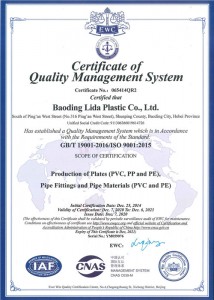Dek . 24, 2024 21:51 Back to list
75mm pvc pipe
Understanding 75mm PVC Pipes Versatility and Applications
PVC, or polyvinyl chloride, has become an integral material in many industries due to its versatility, durability, and cost-effectiveness. Among the various sizes available, the 75mm PVC pipe stands out for its numerous applications in construction, plumbing, and irrigation. This article focuses on the characteristics, advantages, and uses of 75mm PVC pipes, providing insights into why they are favored in both residential and industrial projects.
Characteristics of 75mm PVC Pipes
The 75mm PVC pipe is characterized by its diameter of 75 millimeters, making it suitable for a range of applications that require efficient fluid transport. PVC is known for its lightweight nature and resistance to corrosion, which makes it an excellent choice for piping systems that might be exposed to harsh environmental conditions. Additionally, PVC pipes are typically segmented in 6-meter lengths and can be easily coupled together using various fittings, creating a customizable piping system that meets specific needs.
Another critical characteristic of 75mm PVC pipes is their ease of installation. Unlike metal pipes that may rust or be prone to scaling, PVC pipes remain smooth internally, minimizing friction losses and enhancing flow efficiency. This smooth surface does not support bacterial growth, making PVC pipes a hygienic option for drinking water and other hygienic applications.
Advantages of Using 75mm PVC Pipes
One of the primary advantages of 75mm PVC pipes is their cost-effectiveness. The manufacturing process of PVC is economical, and this translates to lower prices for consumers. Additionally, the long lifespan of PVC—often exceeding 50 years—means that the initial investment can lead to significant savings over time due to reduced replacement and maintenance costs.
75mm pvc pipe

Furthermore, the lightweight nature of PVC allows for easier handling and installation, reducing the need for heavy machinery and labor costs. This characteristic is particularly beneficial in locations where access is limited or in projects requiring rapid deployment. PVC also has good chemical resistance, making it suitable for transporting a wide range of substances, including wastewater and various chemicals used in industrial processes.
Applications of 75mm PVC Pipes
75mm PVC pipes find application in various sectors, reinforcing their versatility. In plumbing systems, they are commonly used for drainage and venting applications due to their ability to handle large volumes of water efficiently. The pipes are also employed in rainwater harvesting systems, helping to channel water from rooftops to storage tanks effectively.
In the agricultural sector, 75mm PVC pipes are ideal for irrigation systems. They facilitate the distribution of water across large areas, supporting agricultural productivity and water conservation efforts. The durability and resistance to environmental factors ensure longevity in outdoor conditions, making them a reliable choice for farmers.
Moreover, these pipes are increasingly used in electrical and telecommunications conduits. The non-conductive nature of PVC makes it a safe choice for housing electrical cables, protecting them from physical damage while maintaining easy access for maintenance and upgrades.
Conclusion
In summary, 75mm PVC pipes offer a multitude of advantages that cater to a wide range of applications across various industries. Their lightweight, durable, and corrosion-resistant properties make them an ideal choice for plumbing, irrigation, and infrastructural projects. As industries continue to seek cost-effective and efficient solutions, the popularity of 75mm PVC pipes is set to grow, solidifying their place as a staple in modern construction and engineering. Whether it’s for a small home project or a large industrial endeavor, these pipes offer reliable performance that meets the demands of today’s infrastructure needs.
-
Durable PP Rigid Sheet: Lightweight, Chemical Resistant Solutions
NewsAug.21,2025
-
PVC Grey Sheet for Extraction: Chemical Resistant & Durable
NewsAug.19,2025
-
Durable PVC Pipe Fittings for Plumbing & Irrigation Needs
NewsAug.18,2025
-
HDPE Steel Belt Reinforced Spiral Corrugated Pipe | High Strength
NewsAug.17,2025
-
HDPE Pipe Fittings: Durable, Leak-Proof Solutions
NewsAug.16,2025
-
Premium CPVC Sheet: High-Temp & Chemical Resistant Solutions
NewsAug.15,2025

